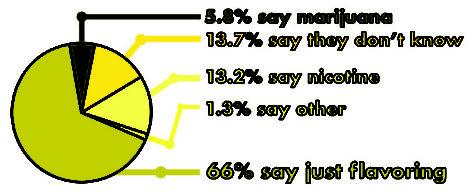Staff works to break teen nicotine addiction: Levels of student vaping continue to escalate
November 22, 2019
In response to the vaping epidemic that is plaguing teens across the nation, DGS is offering numerous resources for students who are coping with a vaping addiction. The number one resource is Student Assistant Coordinator Diana Benoist.
Benoist is the go-to person for students who decide to seek help voluntarily as well as for those who get caught vaping at school. Conversations between her and students remain confidential, and they concentrate on the student’s place in his or her addiction.
“Oftentimes, it’ll come out that the student really has tried to quit … but is struggling to do that because nicotine is incredibly addictive, so sometimes I’ll start working with students that way, and we’ll start doing some goal-setting,” Benoist said. “I’ll try to check in regularly.”
Benoist uses a number of outside resources, including apps and community groups, that help students keep track of their progress. As of now, there are relatively few community resources available because vaping has only recently become commonplace.
“Because vaping is a relatively new phenomenon, there’s not a lot of community resources — they just haven’t been developed yet. There are a couple of counseling agencies in the area that are trying to work on developing more of a program for students who are trying to quit. … It’s a lot of conversation and goal-setting and working on reducing use. That’s the primary strategy,” Benoist said.
In addition students’ individual counselors also act as a first line of help for students with vaping addictions.
Students are referred to school nurse Gloria Barrera if they are experiencing health problems related to vaping. Barrera explained that there are a number of known health effects linked to vaping.
“It causes shortness of breath, headaches, vomiting, and in the worst cases, they can be sent to the hospital with a lung disease, and that’s, of course, thinking about long-term,” Barrera said.
If a student is referred to her, Barrera will perform a nursing assessment concentrated on the lungs. The results would then be documented and sent to that student’s dean.
Some students believe the school needs to do a more active job of advertising the help that it offers. Junior Raj Khullar doesn’t feel that many students who vape are aware of the school’s resources.

“Because vaping is a new phenomenon, many students don’t know the full implications of what they’re using.”
“I don’t think they do a good job of advertising what they have to help you get off of it if you’re on it. Instead, they just have a bunch of posters telling you not to do it. … On that ad they could put up what resources they have, instead of just an anti-Juul ad at the end, they could put up what resources they have to help you get off of it if you have an addiction,” Khullar said.
Barrera believes that students need to be better educated. Because vaping is a new phenomenon, many students don’t know the full implications of what they’re using.
“Maybe students really don’t understand that there are these chemicals, and metals and artificial flavorings that can cause everything that I mentioned already. Just not being aware … if you were aware, you probably wouldn’t be doing it. There’s not enough education out there,” Barrera said.